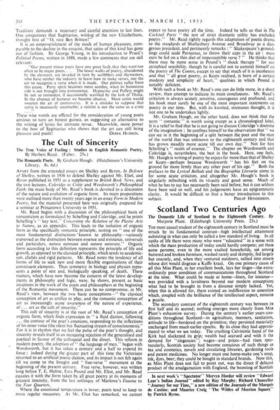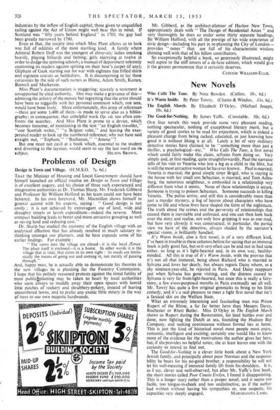Scotland Two Centuries Ago
The Domestic Life of Scotland in the Eighteenth Century. By Marjorie Plant. (Edinburgh University Press. 25s.)
THE most casual student of the eighteenth century in Scotland must be struck by its fundamental contrast—high intellectual attainment subsisting in what can only be called a low standard of living. In all ranks of life there were many who were "educated" in a sense with which the mass production of today could hardly compete; yet these same persons, even in the more exalted households, sat among battered and broken furniture, washed rarely and skimpily, fed largely but coarsely, and, when they ventured outdoors, sallied into streets whose dirt would disgrace a Kaffir kraal. On one primary cause of all this Miss Plant, in her excellent book, lays her finger—the extra- ordinarily poor condition of communications throughout Scotland at the time. What could be made at home—linen, for instance— was provided with a lavishness beyond our modern conception; what had to be brought in from a distance simply lacked. Yet, When this is allowed for, there existed an indifference to amenities which, coupled with the brilliance of the intellectual aspect, remains a puzzle. The secondary contrast of the eighteenth century was between its first half and its second; nothing emerges more clearly from Miss Plant's exhaustive survey. During the century's earlier years con- ditions throughout Scotland—in agriculture, manners, sanitation, attitude to life—bordered on the primitive; they persisted materially unchanged from much earlier epochs. By its close they had approxi- mated to what we see today. The crushing Calvinistic hand of the Kirk had slackened its grip; wealth had accrued and with it the demand for "elegancies"; wages—and prices—had risen spec- tacularly, Scottish society had become conscious of such things as tea and cosmetics, novels_and circulating libraries, gardening tools and patent medicines. No longer must one home-make one's soap, ink, dyes, beer; they could be bought in standard brands. Now this, as Miss Plant does not fail to point out, was the direct if delayed product of the amalgamation with England, the boosting of Scottish Industries by the infl9w of English capital; those given to unqualified railing against the Act of Union might well bear this in mind. If Scotland was "fifty years behind England" in 1700, the gap had been greatly narrowed by 1790.
Even at that, the society into which Miss Plant allows us to look was full of oddities of the most startling kind. A family where Admiral Robert Duff was the .youngest of thirty-six; ladies smoking heavily, playing billiards and betting; girls marrying at twelve in order to dodge the spinning schools; a manual of deportment tolenutly cautioning its readers against spitting on their host's carpet (if any); Oliphant of Gask starting out for war with eighteen fine frilled shirts and eighteen cravats as battledress. It is disconcerting to lay these curiosities by the side of such names as Mime, Adam Smith, Karnes; Boswell and Mackenzie.
Miss Plant's documentation is staggering; scarcely a statement is unsupported by cited authority. One may make a grievance of this— admiring the artistry of the mosaic but regretting that the artist should have been so niggardly with her personal comment which, one sees, would have been lively. More unfortunately, this army of references —there are some 1,400 of them—is made to serve also as a biblio- graphy; in consequence, that unhelpful work Op. cit. too often con- fronts the searcher. And Miss Plant is prone to a device, which becomes tiresome, of mentioning in the text "an English traveller," "one Scottish writer," "a Belgian valet," and leaving the exas- perated reader to look up the numbered reference; why not have said straight out, "Topham," "Buchanan," "Amour"?
But one must not cavil at a book which, essential to the student and diverting to the layman, would seem to say the last word on its



































 Previous page
Previous page